
Neal Town Stephenson is an American writer known for his works of speculative fiction. His novels have been categorized as science fiction, historical fiction, cyberpunk, postcyberpunk, and baroque.

Timothy Thomas Powers is an American science fiction and fantasy author. Powers has won the World Fantasy Award twice for his critically acclaimed novels Last Call and Declare. His 1987 novel On Stranger Tides served as inspiration for the Monkey Island franchise of video games and was optioned for adaptation into the fourth Pirates of the Caribbean film.

Gregory Dale Bear was an American writer and illustrator best known for science fiction. His work covered themes of galactic conflict, parallel universes, consciousness and cultural practices, and accelerated evolution. His most recent work was the 2021 novel The Unfinished Land. Greg Bear wrote over 50 books in total.

James White was a Northern Irish author of science fiction novellas, short stories and novels. He was born in Belfast and returned there after spending some early years in Canada. After a few years working in the clothing industry, he worked at Short Brothers Ltd., an aircraft company based in Belfast, from 1965 until taking early retirement in 1984 as a result of diabetes. White married Margaret Sarah Martin, another science fiction fan, in 1955 and the couple had three children. He died of a stroke.

Foundation's Edge (1982) is a science fiction novel by American writer Isaac Asimov, the fourth book in the Foundation Series. It was written more than thirty years after the stories of the original Foundation trilogy, due to years of pressure by fans and editors on Asimov to write another, and, according to Asimov himself, the amount of the payment offered by the publisher. It was his first novel to ever land on The New York Times best-seller list, after 262 books and 44 years of writing.

Glen David Brin is an American scientist and author of science fiction. He has won the Hugo, Locus, Campbell and Nebula Awards. His novel The Postman was adapted into a 1997 feature film starring Kevin Costner.

Gene Rodman Wolfe was an American science fiction and fantasy writer. He was noted for his dense, allusive prose as well as the strong influence of his Catholic faith. He was a prolific short story writer and novelist, and won many literary awards. Wolfe has been called "the Melville of science fiction", and was honored as a Grand Master by the Science Fiction and Fantasy Writers of America.

The John W. Campbell Memorial Award for Best Science Fiction Novel, or Campbell Memorial Award, was an annual award presented to the author of the best science fiction novel published in English in the preceding calendar year. It was given by several organizations from 1973-1979 and then by the Center for the Study of Science Fiction at the University of Kansas until 2019. It is the novel counterpart of the Theodore Sturgeon Award for best short story, awarded at the same conference by the Theodore Sturgeon Literary Trust. The award is named in honor of John W. Campbell (1910–1971), whose science fiction writing and role as editor of Analog Science Fiction and Fact made him one of the most influential editors in the early history of science fiction. The award was established in 1973 by writers and critics Harry Harrison and Brian Aldiss "as a way of continuing his efforts to encourage writers to produce their best possible work." Locus magazine has listed it as one of the "major awards" of written science fiction.
Sarah Zettel is an American author, primarily of science fiction. Her first short story was published in Analog Science Fiction and Fact in 1991. Zettel's novels have won multiple awards, including the Philip K. Dick Award and the Locus Award for Best First Novel, and positive reviews from critics. Her first novel Reclamation was published in 1996 and her second novel Fool's War in 1997. She has written romance novels and mysteries under the pseudonym Darcie Wilde, and the novel Bitter Angels as C. L. Anderson.

Joe William Haldeman is an American science fiction author. He is best known for his novel The Forever War (1974). That novel and other works, including The Hemingway Hoax (1991) and Forever Peace (1997), have won science fiction awards, including the Hugo Award and Nebula Award. He was awarded the SFWA Grand Master for career achievements. In 2012 he was inducted as a member of the Science Fiction Hall of Fame. Many of Haldeman's works, including his debut novel War Year and his second novel The Forever War, were inspired by his experiences in the Vietnam War. Wounded in combat, he struggled to adjust to civilian life after returning home. From 1983 to 2014, he was a professor teaching writing at the Massachusetts Institute of Technology (MIT).
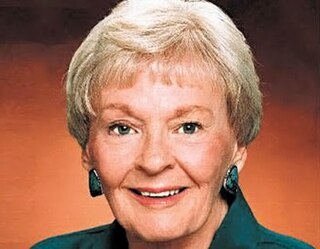
Sheri Stewart Tepper was an American writer of science fiction, horror and mystery novels. She is primarily known for her feminist science fiction, which explored themes of sociology, gender and equality, as well as theology and ecology. Often referred to as an eco-feminist of science fiction literature, Tepper personally preferred the label eco-humanist. Though the majority of her works operate in a world of fantastical imagery and metaphor, at the heart of her writing is real-world injustice and pain. She employed several pen names during her lifetime, including A. J. Orde, E. E. Horlak, and B. J. Oliphant.

The World Fantasy Awards are given each year by the World Fantasy Convention for the best fantasy fiction published in English during the previous calendar year. The awards have been described by book critics such as The Guardian as a "prestigious fantasy prize", and one of the three most prestigious speculative fiction awards, along with the Hugo and Nebula Awards. The World Fantasy Award—Novel is given each year for fantasy novels published in English or translated into English. A work of fiction is defined by the organization as a novel if it is 40,000 words or longer; awards are also given out for pieces of shorter lengths in the Short Fiction and Novella categories. The Novel category has been awarded annually since 1975.
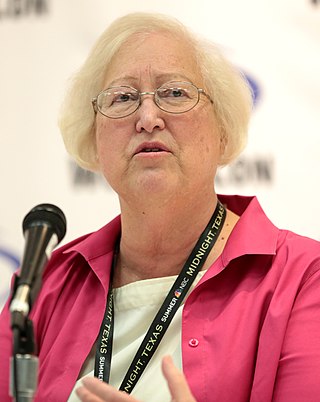
Constance Elaine Trimmer Willis, commonly known as Connie Willis, is an American science fiction and fantasy writer. She has won eleven Hugo Awards and seven Nebula Awards for particular works—more major SF awards than any other writer—most recently the "Best Novel" Hugo and Nebula Awards for Blackout/All Clear (2010). She was inducted by the Science Fiction Hall of Fame in 2009 and the Science Fiction Writers of America named her its 28th SFWA Grand Master in 2011.
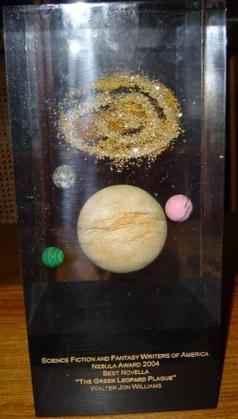
The Nebula Award for Best Novel is given each year by the Science Fiction and Fantasy Writers of America (SFWA) for science fiction or fantasy novels. A work of fiction is considered a novel by the organization if it is 40,000 words or longer; awards are also given out for pieces of shorter lengths, in the categories of short story, novelette, and novella. To be eligible for Nebula Award consideration, a novel must have been published in English in the United States. Works published in English elsewhere in the world are also eligible, provided they are released on either a website or in an electronic edition. The Award has been given annually since 1966. Novels which were expanded forms of previously published stories are eligible, and novellas published individually can be considered as novels if the author requests it. The award has been described as one of "the most important of the American science fiction awards" and "the science-fiction and fantasy equivalent" of the Emmy Awards.
Betty Ballantine was an American publisher, editor, and writer. She was born during the Raj to a British colonial family. After her marriage to Ian Ballantine in 1939, she moved to New York where they created Bantam Books in 1945 and established Ballantine Books in 1952. They became freelance publishers in the 1970s. Their son, Richard, was an author and journalist specializing in cycling topics.
Lisa Goldstein is an American fantasy and science fiction writer whose work has been nominated for Nebula, Hugo, and World Fantasy Awards. Her 1982 novel The Red Magician won a National Book Award in the one-year category Original Paperback and was praised by Philip K. Dick shortly before his death. Her 2011 novel, The Uncertain Places, won the 2012 Mythopoeic Fantasy Award for Adult Literature, and her short story, "Paradise Is a Walled Garden," won the 2011 Sidewise Award for Best Short-Form Alternate History.

Nancy Holder is an American writer and the author of several novels, including numerous tie-in books based on the TV series Buffy the Vampire Slayer. She's also written fiction related to several other science fiction and fantasy shows, including Angel and Smallville.
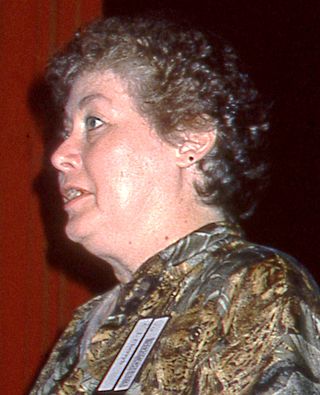
American writer C. J. Cherryh's career began with publication of her first books in 1976, Gate of Ivrel and Brothers of Earth. She has been a prolific science fiction and fantasy author since then, publishing over 80 novels, short-story compilations, with continuing production as her blog attests. Cherryh has received the Hugo and Locus Awards for some of her novels.
Charles Coleman Finlay is an American science fiction and fantasy author and editor.
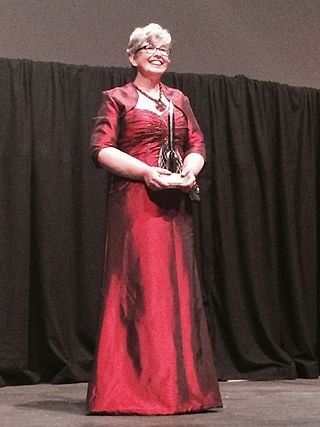
Ann Leckie is an American author of science fiction and fantasy. Her 2013 debut novel Ancillary Justice, in part about artificial consciousness and gender-blindness, won the 2014 Hugo Award for "Best Novel", as well as the Nebula Award, the Arthur C. Clarke Award, and the BSFA Award. The sequels, Ancillary Sword and Ancillary Mercy, each won the Locus Award and were nominated for the Nebula Award. Provenance, published in 2017, is also set in the Imperial Radch universe. Leckie's first fantasy novel, The Raven Tower, was published in February 2019.
















